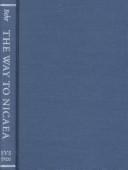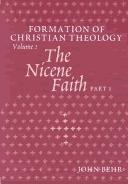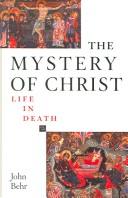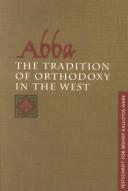| Listing 1 - 10 of 25 | << page >> |
Sort by
|

ISBN: 0881412244 0881412309 9780881412246 Year: 2001 Volume: 1 Publisher: New York: St Vladimir's seminary press,
Abstract | Keywords | Export | Availability | Bookmark
 Loading...
Loading...Choose an application
- Reference Manager
- EndNote
- RefWorks (Direct export to RefWorks)
Patrology --- Theology, Doctrinal --- History --- 230.21 --- -Theology, Doctrinal --- -Christian doctrines --- Christianity --- Doctrinal theology --- Doctrines, Christian --- Dogmatic theology --- Fundamental theology --- Systematic theology --- Theology, Dogmatic --- Theology, Systematic --- Theology --- Orthodoxe systematische en dogmatische theologie --- -History --- -Doctrines --- -Orthodoxe systematische en dogmatische theologie --- -230.21 --- 230.21 Orthodoxe systematische en dogmatische theologie --- -230.21 Orthodoxe systematische en dogmatische theologie --- Christian doctrines --- Jesus Christ --- Christ --- Cristo --- Jezus Chrystus --- Jesus Cristo --- Jesus, --- Jezus --- Christ, Jesus --- Yeh-su --- Masīḥ --- Khristos --- Gesù --- Christo --- Yeshua --- Chrystus --- Gesú Cristo --- Ježíš --- Isa, --- Nabi Isa --- Isa Al-Masih --- Al-Masih, Isa --- Masih, Isa Al --- -Jesus, --- Jesucristo --- Yesu --- Yeh-su Chi-tu --- Iēsous --- Iēsous Christos --- Iēsous, --- Kʻristos --- Hisus Kʻristos --- Christos --- Jesuo --- Yeshuʻa ben Yosef --- Yeshua ben Yoseph --- Iisus --- Iisus Khristos --- Jeschua ben Joseph --- Ieso Kriʻste --- Yesus --- Kristus --- ישו --- ישו הנוצרי --- ישו הנצרי --- ישוע --- ישוע בן יוסף --- المسيح --- مسيح --- يسوع المسيح --- 耶稣 --- 耶稣基督 --- 예수그리스도 --- Jíizis --- Yéshoua --- Iėsu̇s --- Khrist Iėsu̇s --- عيسىٰ --- History of doctrines --- عيسىٰ --- Theology, Doctrinal - History - Early church, ca. 30-600.

ISBN: 0198270003 0191683868 9780198270003 Year: 2000 Publisher: Oxford: Oxford university press,
Abstract | Keywords | Export | Availability | Bookmark
 Loading...
Loading...Choose an application
- Reference Manager
- EndNote
- RefWorks (Direct export to RefWorks)
Asceticism --- Theological anthropology --- History --- Christianity --- History of doctrines --- Irenaeus, --- Clement, --- 248.1 --- 276 =75 IRENAEUS LUGDUNENSIS --- 276 =75 CLEMENS ALEXANDRINUS --- -Man (Theology) --- -233 --- Anthropology, Doctrinal --- Anthropology, Theological --- Body and soul (Theology) --- Doctrinal anthropology --- Humanity, Doctrine of --- Man, Doctrine of --- Man (Theology) --- Mankind, Doctrine of --- Religion --- Ascetical theology --- Contempt of the world --- Theology, Ascetical --- Christian life --- Ethics --- Ascetische theologie --- Griekse patrologie--IRENAEUS LUGDUNENSIS --- Griekse patrologie--CLEMENS ALEXANDRINUS --- -History of doctrines --- -De mens. Theologische antropologie --- Irenaeus Saint, Bishop of Lyon --- Clement of Alexandria, Saint --- 248.1 Ascetische theologie --- 233 --- De mens. Theologische antropologie --- Irenaeus, Sanctus --- Irenaeus --- Clemens, --- Clemens, Titus Flavius, --- Clément, --- Clemente, --- Klemens, --- Klēmens, --- Kliment, --- Titus Flavius Clemens, --- إكليمنضس السكندري --- Irenaeus Lugdunensis. --- Klēmēs, --- Irenaeus Lugdunensis --- Asceticism - History - Early church, ca 30-600 --- Theological anthropology - Christianity - History of doctrines - Early church, ca 30-600 --- Irenaeus, - Saint, Bishop of Lyon --- Clement, - of Alexandria, Saint, - approximately 150-approximately 215
Book
ISBN: 9780198837534 0198837534 0191874175 0192574442 Year: 2019 Publisher: Oxford: Oxford university press,
Abstract | Keywords | Export | Availability | Bookmark
 Loading...
Loading...Choose an application
- Reference Manager
- EndNote
- RefWorks (Direct export to RefWorks)
"John the theologian and his Paschal Gospel brings three different kinds of readers of the Gospel of John together with the theological goal of understanding what is meant by Incarnation and how it relates to Pascha, the Passion of Christ, how this is conceived of as revelation, and how we speak of it. The first group of readers are the Christian writers from the early centuries, some of whom (such as Irenaeus of Lyons) stood in direct continuity, through Polycarp of Smyrna, with John himself. In exploring these writers, John Behr offers a glimpse of the figure of John and the celebration of Pascha, which is held to have started with him. The second group of readers are modern scriptural scholars, from whom we learn of the apocalyptic dimensions of John's Gospel and the way in which it presents the life of Christ in terms of the Temple and its feasts. Christ's own body, finally erected on the cross, is seen as the true Temple in an offering of love rather than a sacrifice for sin--an offering in which Jesus becomes the flesh he offers for consumption, the bread which descends from heaven, so that 'Incarnation' is not an event now in the past, but the embodiment of God in those who follow Christ in the present. The third reader is Michel Henry, a French phenomenologist, whose reading of John opens up further surprising dimensions of this Gospel, which yet align with those uncovered in the first parts of this work. This thought-provoking work brings these threads together to reflect on the nature and task of Christian theology." --
Jesus Christ --- Christ --- Cristo --- Jezus Chrystus --- Jesus Cristo --- Jesus, --- Jezus --- Christ, Jesus --- Yeh-su --- Masīḥ --- Khristos --- Gesù --- Christo --- Yeshua --- Chrystus --- Gesú Cristo --- Ježíš --- Isa, --- Nabi Isa --- Isa Al-Masih --- Al-Masih, Isa --- Masih, Isa Al --- -Jesus, --- Jesucristo --- Yesu --- Yeh-su Chi-tu --- Iēsous --- Iēsous Christos --- Iēsous, --- Kʻristos --- Hisus Kʻristos --- Christos --- Jesuo --- Yeshuʻa ben Yosef --- Yeshua ben Yoseph --- Iisus --- Iisus Khristos --- Jeschua ben Joseph --- Ieso Kriʻste --- Yesus --- Kristus --- ישו --- ישו הנוצרי --- ישו הנצרי --- ישוע --- ישוע בן יוסף --- المسيح --- مسيح --- يسوع المسيح --- 耶稣 --- 耶稣基督 --- 예수그리스도 --- Jíizis --- Yéshoua --- Iėsu̇s --- Khrist Iėsu̇s --- عيسىٰ --- Person and offices. --- Passion. --- Bible. --- Jean (Book of the New Testament) --- Johanisi (Book of the New Testament) --- Johannesevangelium --- John (Book of the New Testament) --- Yohan pogŭm --- Yohane den (Book of the New Testament) --- Yūḥannā (Book of the New Testament) --- Criticism, interpretation, etc. --- Person and offices --- Passion --- Ioganaĭ (Book of the New Testament) --- Иоганай (Book of the New Testament) --- Jesus Christ - Person and offices --- Jesus Christ - Passion

ISBN: 0881412600 0881412651 088141266X Year: 2004 Publisher: Crestwood, N.Y. St. Vladimir's Seminary Press
Abstract | Keywords | Export | Availability | Bookmark
 Loading...
Loading...Choose an application
- Reference Manager
- EndNote
- RefWorks (Direct export to RefWorks)
Church history --- Dogma, Development of --- Theology, Doctrinal --- 238.2 --- 238.2 Symbola. Artikelen van het geloof --- Symbola. Artikelen van het geloof --- Doctrinal development, Christian --- Doctrine, Development of Christian --- Dogma --- History --- Nicene Creed. --- Niceno-Constantinopolitan Creed --- Symbolum Nicaenum --- Nicaenische Glaubensbekenntnis --- Nizänisches Glaubensbekenntnis --- Constantinopolitan Creed --- Credo des Conciles de Nicée-Constantinople --- Symbolum Constantinopolitanum --- Glaubensbekenntnis von Nizäa-Konstantinopel --- Nikaian-Konstantinopolin uskontunnustus --- NK --- Σύμβολον της Πίστεως --- Symvolon tēs Pisteōs --- Icon/Symbol of the Faith --- Profession of Faith of the 318 Fathers --- Profession of Faith of the 150 Fathers --- Credo (Nicene Creed) --- Patrology

ISBN: 0881413062 9780881413069 Year: 2006 Publisher: Crestwood St Vladimir's seminary press
Abstract | Keywords | Export | Availability | Bookmark
 Loading...
Loading...Choose an application
- Reference Manager
- EndNote
- RefWorks (Direct export to RefWorks)
Theology, Doctrinal --- History --- Jesus Christ --- History of doctrines
Book
ISBN: 9780199684021 0199684022 9780198797111 0198797117 9780198797128 0198797125 Year: 2017 Publisher: New York, NY : Oxford University Press,
Abstract | Keywords | Export | Availability | Bookmark
 Loading...
Loading...Choose an application
- Reference Manager
- EndNote
- RefWorks (Direct export to RefWorks)
On First Principles by Origen of Alexandria, written around 220-230 AD, is one of the most important and contentious works of early Christianity. It provoked controversy when written, provoked further debate when translated into Latin by Rufinus in the fourth century, and was the subject, together with its author, of condemnation in the sixth century. As a result, the work no longer survives intact in the original Greek. We only have the complete work in the Latin translation of Rufinus, and a few extensive passages preserved in Greek by being excerpted into the Philokalia of Basil of Caesarea and Gregory of Nazianzus. John Behr provides a new edition and translation of one of the most important texts from early Christianity. He includes an invaluable introduction, which provides a clear structure of the work with significant implications for how the text is to be read and for understanding the character of theology in the early Christian tradition
Book
ISBN: 9781514000908 1514000903 9781514000915 Year: 2022 Publisher: Downers Grove IVP Academic
Abstract | Keywords | Export | Availability | Bookmark
 Loading...
Loading...Choose an application
- Reference Manager
- EndNote
- RefWorks (Direct export to RefWorks)
In this manifesto of sorts, Bishop Emilio Alvarez introduces the phenomenon of Pentecostals returning to the ancient, creedal Christian faith, and extends the project of paleo-orthodox ressourcement to include orthodox expressions within Pentecostalism, particularly in his own Afro-Latino Pentecostal movement.
Pentecostal churches --- Relations --- Orthodox Eastern Church --- Pentecostal churches.

ISBN: 0881412481 Year: 2003 Publisher: Crestwood St. Vladimir's Seminary Press
Abstract | Keywords | Export | Availability | Bookmark
 Loading...
Loading...Choose an application
- Reference Manager
- EndNote
- RefWorks (Direct export to RefWorks)
Kallistos, --- Orthodox Eastern Church --- Doctrines. --- History.
Book
ISBN: 9781498509588 Year: 2015 Publisher: Eugene, Oregon Cascade
Abstract | Keywords | Export | Availability | Bookmark
 Loading...
Loading...Choose an application
- Reference Manager
- EndNote
- RefWorks (Direct export to RefWorks)
Book
ISBN: 9780192843975 Year: 2023 Publisher: New York Oxford University Press
Abstract | Keywords | Export | Availability | Bookmark
 Loading...
Loading...Choose an application
- Reference Manager
- EndNote
- RefWorks (Direct export to RefWorks)
This book presents the first modern critical edition of the work of Gregory of Nyssa, On the Human Image of God (formerly known as On the Making of Man, De hominis opificio) and the first English translation since the nineteenth century. This treatise is one of the most important of Gregory's texts. Paralleling the structure of Plato's Timaeus, Gregory's work begins by offering two analyses of the human being. The first presents the human being as the culmination of the ascent made by nature through the various levels of life, and as made, body and soul, in the image of God. The second considers why this is not immediately apparent, the need for time to be able to grow, individually and collectively, to this status, as the body of Christ, the image of God, and the role of sexuality within this growth. The third part of the work brings both analyses together, to see the same movement in the life-span of each person. The extensive introduction provided in this volume examines the philosophical and theological background of Gregory's text, beginning with Anaxagoras, Plato (the Timaeus), Philo, and Origen, and also compares aspects of Gregory's work with that of Irenaeus of Lyons and Maximos the Confessor.--
| Listing 1 - 10 of 25 | << page >> |
Sort by
|

 Search
Search Feedback
Feedback About UniCat
About UniCat  Help
Help News
News